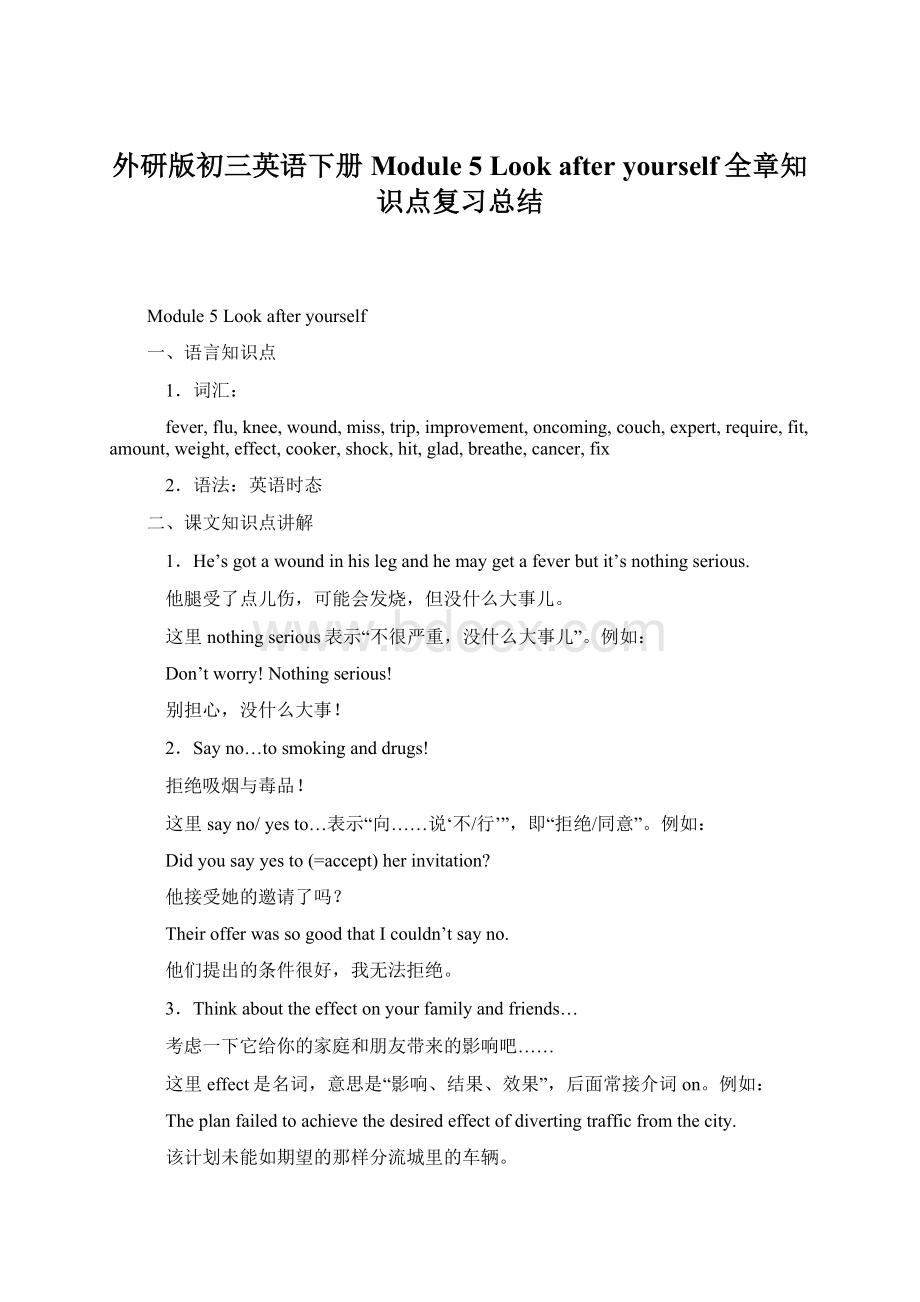外研版初三英语下册Module 5 Look after yourself全章知识点复习总结.docx
《外研版初三英语下册Module 5 Look after yourself全章知识点复习总结.docx》由会员分享,可在线阅读,更多相关《外研版初三英语下册Module 5 Look after yourself全章知识点复习总结.docx(12页珍藏版)》请在冰豆网上搜索。

外研版初三英语下册Module5Lookafteryourself全章知识点复习总结
Module5Lookafteryourself
一、语言知识点
1.词汇:
fever,flu,knee,wound,miss,trip,improvement,oncoming,couch,expert,require,fit,amount,weight,effect,cooker,shock,hit,glad,breathe,cancer,fix
2.语法:
英语时态
二、课文知识点讲解
1.He’sgotawoundinhislegandhemaygetafeverbutit’snothingserious.
他腿受了点儿伤,可能会发烧,但没什么大事儿。
这里nothingserious表示“不很严重,没什么大事儿”。
例如:
Don’tworry!
Nothingserious!
别担心,没什么大事!
2.Sayno…tosmokinganddrugs!
拒绝吸烟与毒品!
这里sayno/yesto…表示“向……说‘不/行’”,即“拒绝/同意”。
例如:
Didyousayyesto(=accept)herinvitation?
他接受她的邀请了吗?
TheirofferwassogoodthatIcouldn’tsayno.
他们提出的条件很好,我无法拒绝。
3.Thinkabouttheeffectonyourfamilyandfriends…
考虑一下它给你的家庭和朋友带来的影响吧……
这里effect是名词,意思是“影响、结果、效果”,后面常接介词on。
例如:
Theplanfailedtoachievethedesiredeffectofdivertingtrafficfromthecity.
该计划未能如期望的那样分流城里的车辆。
Theaccidenthadahugeeffectonherlife.
那场事故对她的生活影响很大。
三、语法:
动词时态
英语时态用共有十六种时态,其中初中阶段常考的有8种,它们是:
一般现在时、一般过去时、一般将来时、现在进行时、现在完成时、过去进行时、过去完成时和过去将来时。
1.一般现在时的基本用法
a.经常性或习惯性的动作,常与表示频度的时间状语连用。
时间状语:
every…,sometimes,at…,onSunday,always,often,usually等。
Ileavehomeforschoolat7everymorning.
b.客观真理,客观存在,科学事实。
Theearthmovesaroundthesun.
ShanghailiesintheeastofChina.
c.表示格言或警句中。
Pridegoesbeforeafall.
注意:
此用法如果出现在宾语从句中,即使主句是过去时,从句谓语也要用一般现在时。
例:
Columbusprovedthattheearthisround.
d.在时间状语从句或条件状语从句中,一般现在时代替一般将来时。
I’llhelpyouassoonasyouhaveproblem.
TellXiaoLiaboutitifyoumeethim.
2.一般过去时的用法:
表示过去某一时刻或某一段时间内所发生的动作或情况,通常一般过去式带有表示动作时间状语的词,词组或从句,如yesterday,thedaybeforeyesterday,lastweek,twodaysago,justnow,amomentago,in1990,thismorning等。
Iworkedinthatfactorylastyear.
此外,“usedto”也可用于表示过去曾经存在过的状态。
例如:
Thisriverusedtobeclean.
3.一般将来时的用法
a.表示将来的动作或状态。
例如:
Ishallattendthemeetingtomorrow.
b.表示将来的意愿,决心,许诺,命令等时常用will,征求对方意见,主语是第一人称时,常用shall。
Iwilldomybesttocatchupwiththem.
ShallIopenthedoor?
c.be+going+动词不定式。
也是一种将来时句型,表示打算,计划,最近或将来要作的某事。
IamgoingtoBeijingnextweek.
d.be+动词不定式。
表示有职责,义务,可能,约定,意图等。
Thereistobeameetingthisafternoon.
Wearetomeettheguestsatthestation.
e.beabout+动词不定式,表示马上,很快作某事。
Theyareabouttoleave.
4.现在进行时的用法
a.现在进行时的用法表示说话者说话时正在发生或者进行的动作。
Whatareyoudoingnow?
Iamlookingformykey.
b.现在进行时表示目前一段时间内正在进行的动作(但说话时这个动作不一定在进行)。
Thestudentsarepreparingfortheexamination.
c.某些动词的现在进行时可以表示即将发生的动作,这些动词有arrive,come,leave,start等。
TheyaregoingtoHongKongtomorrow.
注意:
有些动词一般不可以用于进行时态。
①表示状态的动词,尤其是静态动词,如:
be,have
②表示认识、知觉和情感的动词,如:
know,think,hear,find,see,like,want,wish,prefer
5.现在完成时的用法
a.现在完成时表示在说话之前已经完成或刚完成的动作。
Ihaveboughtaten-speedbicycle.
Theyhavecleanedtheclassroom.
b.现在完成时表示动作从过去开始持续到现在,或者还有可能持续下去的动作或状态。
现在完成时常与for和since引导的短语或从句连用。
Wehavelivedheresince1976.
Theyhavewaitedformorethantwohours.
注意:
一般过去时与现在完成时的区别
过去时表示过去某时发生的动作或单纯叙述过去的事情,强调某一动作在过去发生;现在完成时为过去发生的,强调过去的事情对现在的影响,强调的是影响;一般过去时常与具体的时间状语连用。
试比较:
Isawthisfilmyesterday.(强调看的动作发生过了,不涉及现在)
Ihaveseenthisfilm.(强调对现在的影响,电影的内容已经知道了。
)
6.过去进行时的用法
表示过去某时正在进行的状态或动作。
例如:
IwaswatchingTVwhenshecametoseeme.
注意:
过去进行时和一般过去时都是过去发生的事情,但过去进行时侧重表示过去某一时刻正在进行的动作或所处的状态,强调动作的连续进行,而一般过去时则表示单纯的过去事实,例如:
Theywerebuildingahouselastmonth.(上个月正在建造,建造好与否不知)
Theybuiltanewhouselastmonth.(上个月建造好了,动作已经完成)
7.过去完成时的用法
过去完成时表示过去某一时刻或某一动作之前完成的动作或所处的状态,过去完成时常和by2000,before,bytheendoflastyear,bythetime等词组成的短语和从句连用。
Wehadalreadylearnedtwothousandwordsbytheendoflastyear.
Whenwearrivedatthestation,theyhadwaitedformorethantwentyminutes.
8.过去将来时的用法
过去将来时表示从过去某个时间看将要发生的动作或存在地状态,过去将来时较多地被运用在宾语从句中。
例如:
Theyweregoingtohaveameeting.
ItoldhimthatIwouldseehimoffatthestation.
【典型例题】
1.I’minterestedinanimals,soI_______everySaturdayworkinginananimalhospital.
A.pay B.get C.take D.spend
答案:
D。
该题考查的是pay,get,takespend这四个动词的用法区别。
在这四个动词中,只有spend常用于“spend…dingsth.”的句型里,所以选D。
2. —ListenHelenissinginginthenextroom.
—It_________beHelen.ShehasgonetoBeijing.
A.can’t B.mustn’t C.may D.should
答案:
A。
该题考查的是情态动词的用法。
表示否定地推测通常用can’t。
3.—Icalledyouyesterdayevening,buttherewasnoanswer.
—Oh,IamsorryI_________dinneratmyfriend’shouse.
A.have B.had C.washaving D.havehad
答案:
C。
该题考查的是动词的时态。
他们谈论的是昨天晚上某一时刻发生的事情,所以用过去进行时。
4.—Howlonghaveyou_______themotorbike?
—Forabouttwoweeks.
A.bought B.had C.borrowed D.lent
答案:
B。
该题考查的是延续性动词和非延续性动词的用法区别。
这四个动词中只有had是延续性动词,它的现在完成时可以同表示一段时间的时间状语连用。
5.Doyouknowif ______backnextweek?
Ifhe_____back,pleaseletmeknow.
A.hecomes;willcome B.willhecome;comes
C.hewillcome;comes D.willhecome;willcome
答案:
C。
if既可引导宾语从句,也可引导状语从句。
充当宾语从句的连接词时,相当于whether,词义是“是否”。
充当状语从句的连接词时,词义是“如果”。
从时态看,if引导宾语从句时谓语动词的时态应根据主句的时态作相应的变化;引导表示将来动作或状态的条件句时,若主句用一般将来时,则从句通常用一般现在时表示将来。
6.—When______thiskindofcomputer ______ ?
—Lastyear.
A.did;use B.was;used C.is; used D.are;used
答案:
B。
此例由下句的时间状语推断出一般过去时态,并且要考虑到被动语态。
7.TheteachertoldusyesterdaythatDecember25_________ChristmasDay.
A.is B.was C.hasbeen D.willbe
答案:
A。
有些动词其动词的时态是“违背常理”的。
如宾语从句表示的是一个客观事实或客观真理时,其时态不受主句限制而用一般现在时表示。
8.Hestudiedhardand____passtheexamination.
A.couldableto B.could C.wasableto D.ought
答案:
C。
beableto含有“经过努力而完成某一动作”的意思,相当于managetodo或succeedindoing,而can只“单纯地表示能力或可能”。
四、练习
Ⅰ、单项选择
1.Myfatherwenttoshanghaiyesterday.He______backintwoweeks.
A.comes B.hascome C.willcome D.came
2.It’sspringnow.thestudents________treestheseweeks.
A.plant B.areplanting C.willplant D.planted
3.—__________you________yourbooktothelibrary?
—yes.Ireturnedityesterday.
A.Did,return B.Have,returned C.Will,return D.Do,return
4.—MustIfinishitnow?
—No,you________.
A.mustn’t B.needn’t C.can’t D.shouldn’t
5.Thoughit’scloudynow,it_________getsunnylater.
A.can B.may C.must D.need
6.—Icalledyoulastnightbutnooneansweredthephone.
—I________dinnerwithmyfriendsintherestaurant.
A.have B.had C.washaving D.havehad
7.Ifyouhavelostalibrarybook,youhaveto_________it.
A.findout B.lookafter C.payfor D.takecare
8.Hewillcallmeassoonashe_________thecity.
A.reaches B.reached C.willreach D.isreaching
9.Thecup____offthetableandbroke.
A.wasfelt B.fell
C.wasfallen D.dropped
10.Don’tworry.I’vealready____thedoctor.
A.waitedfor B.sentfor C.passedon D.askedfor
11.Myparentshavelivedhere__________.
A.since1952 B.formanyyearsago
C.manyyeasago D.since1952ago
12.Sofar,she__________herholidayverymuch.
A.hasn’tenjoyed B.didn’tenjoy
C.doesn’tenjoy D.wasnotenjoy
13.“Yourarmisbleeding!
”“Yes,I__________itwithaknife.”
A.hurt B.washurting C.havejusthurt D.hadhurt
14.IwillcomewhenI__________free.
A.willbe B.shallbe C.was D.am
15.WhenIarrivedinBirminghamthesun__________.
A.hasbeenshining B.shone
C.hasshone D.wasshining
16.Bytheendoflastterm,We__________2,500words.
A.hadlearned B.haslearned
C.hasbeenlearned D.learned
17.Whenwegottotheairport,wefoundthattheplane__________.
A.hadalreadytakenoff B.alreadytookoff
C.wasalreadytakenoff D.wasalreadytakingoff
18.ItwasDecember20.InfivedaysitwouldbeChristmasDay.TheLordMayor,together withoverseasstudents,__________tocelebrateit.
A.wasgoing B.willgo
C.isgoing D.went
19.WhileI__________mybreakfastthemorningpostcame.
A.hadhad B.hadbeenhaving
C.washaving D.havehad
20.Twelveinches__________onefoot.
A.make B.makes C.ismaking D.willmake
Ⅱ、完形填空
Ifmorethanonestudentwantstorunyourclass,you’vegottopickthebestone.Grown-ups 1 biggerdecisions.Theypicksomeonefortheircountry.
NowAmericanshavetopick 2 GeorgeW.Bush 3 JohnKerrytobetheirpresident.TheWhiteHousesaid 4 Wednesdaynight(Beijingtime)thatBushhadwontheelection(选举)althoughthefinalresult 5 lateron.
DoyouknowwhoAmericankidslike 6 ?
BushorKerry?
ToAlanBlinder,theanswerseemedtobethesameasthegrown-ups.“ 7 hehasmetpoliticalproblemslikeneverbefore,thepresident 8 hisideas,”saidthe14-year-oldboy.
Infightingterrorists(恐怖分子),Bush 9 hisstrongmind.
Threeyearsago,onSept